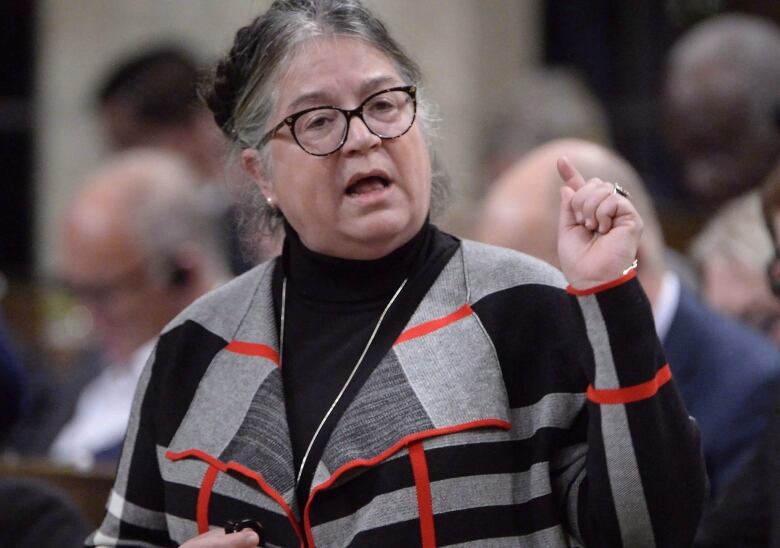Canada proposes shutdown of troubled Maritime elver fishery in 2024
'It is not possible to have a safe and sustainable elver fishery in 2024,' minister says
The federal government has served notice it intends to close the commercial fishery for baby eels, or elvers, in the Maritimes this year six weeks before the season is set to open.
Minister of Fisheries and Oceans Diane Lebouthillier informed licence holders Tuesday and gave them until Feb.23 to respond.
The tiny translucent eels are trapped in the spring in Maritime rivers and shipped live to Asia where they are grown for food. They are a lucrative catchthat can sell for up to $5,000 a kilogram.
In a Feb. 13 letter obtained by CBC News, Lebouthillierreferred to the violence, threats and widespread unauthorized harvesting that has characterized the fishery in recent years.
Lebouthillier said there was not enough time for the Department of Fisheries and Oceans (DFO) to implement enhanced "access for Indigenous communities, a new regulatory framework to regulate and licence the possession and export of elvers, and a suite of operational changes to the management of the elver fishery."
"Based on all the above, it is my view that it is not possible to have a safe and sustainable elver fishery in 2024, and therefore the fishery should not be opened," Lebouthillier wrote.

In a statement, Genna Careyof the Canadian Committee for a Sustainable Eel Fishery (CCSEF)responded on behalf of several of the eight commercial licence holders.
"Preventing legal fishers from doing their jobs will have almost no effect on poachers or Chinese buyers. They will still be there illegally harvesting elvers. In some ways their jobs will be easier without legal fishers watching what they're doing," said Carey.
"CCSEF has been begging DFO for more than two years to take serious steps to address the issues in the fishery. We participated in their sham review and even offered to pay for a traceability system, all to end up losing our livelihoods for our trouble."
In Ottawa, the planned closure dominated an emergency debate at a meeting of the Fisheries and Oceans committee with Conservativesscoffing at DFO's admission it cannot safely manage the fishery this year.
"This is a disgrace.How could you possibly let this happen?" said Newfoundland MP and fisheriescritic Clifford Small.
"How does taking legal harvesters off the river help stop the poaching," demanded Nova ScotiaConservative MP Rick Perkins.

The federal government says it intends to close the commercial fishery for elvers in the Maritimes this year six weeks before the season is set to open. Host Jeff Douglas is joined by Cape Breton-Canso MP Mike Kelloway, who is parliamentary secretary to the minister of fisheries, to learn more about why.
Deputy minister Annette Gibbonssaid it willpreventmixing or laundering of illegal with legal catch.
"This year all of the harvest will be illegal. We willbe out in fullforce," Gibbons told MPs.
Follows a year of chaos
Last year, hundreds of unauthorized fishers flooded to rivers in Nova Scotia and New Brunswickeager to cash in. Many were Indigenousharvesters claiming they were exercising theirtreaty rights to fish and didnot require government approval.
Then-minister Joyce Murray shut down the commercial fishery which includes authorized Indigenous harvesters two weeks into the season.
But widespreadpoaching continued, angering commercial licence holders who were shut out of the fishery, but observed continued unlicensed fishing. They saidfederal enforcement was grossly inadequate, allowing chaotic nighttime scenes of harvesters threatening violence against enforcement officers, whichLebouthillieracknowledged in Tuesday'sletter.
(PDF KB)
(Text KB)CBC is not responsible for 3rd party content
On Tuesday, the Assembly of NovaScotia Mi'kmaw Chiefs reacted angrily to DFO's intentions. In a statement, the assembly said eight First Nations inNova Scotia submitted a proposal to the fisheries minister in Decemberoutlining what they wanted in the upcoming season.
The proposalfromAnnapolis Valley, Bear River, Eskasoni, Glooscap, Pictou Landing, Potlotek, Wasoqopa'q (formerly Acadia)and We'koqma'qindicated expected participation levels, required quota and river designations.
"Clearly, DFO had no intentions of working in good faith with the Mi'kmaq on the elver fishery,"Chief Gerald Toney, fisheries co-lead for the assembly, said in a statement released to CBC News.
"We provided them with a proposal that reflects our inherent rights as Mi'kmaq and included actions for promoting responsible resource management."
Millbrook First Nation Chief Bob Gloade echoed Toney's sentiment on CBC Radio's Mainstreet Halifax on Wednesday.

The federal Department of Fisheries and Oceans says a safe and sustainable elver fishery is not possible in the Maritimes this spring. So what does that mean for Indigenous fishers exercising their treaty rights? Host Jeff Douglas is joined by Milbrook Chief Bob Gloade.
"The problem lies that we need to be able to firmly get the government to understand and to accept our rights, to acknowledge the rights-based fisheries supersedes the commercial plans," Gloade told Mainstreet.
"And we need to have meaningful discussions with our communities and with DFO, and how we're going to work together collectively, because it's a shared resource."
After the shutdown in 2023,DFO embarked on a review of the commercial elver fishery.
It hadannounced it would implement a new licence system for the 2024 season that would require an export and possession licence for elvers to increase traceability.
"Despite the department's best efforts, these changes will not be in place to support a 2024 fishery," Lebouthillier wrote.













_(720p).jpg)


 OFFICIAL HD MUSIC VIDEO.jpg)
.jpg)



























































































